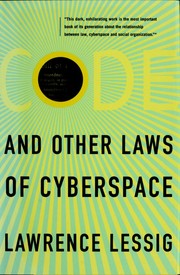Check nearby libraries
Buy this book

Examines the relation between cyberspace and government, particularly the government's ability to regulate. Contrary to popular belief, cyberspace can be regulated through architecture and its representation as code. Government and commerce are working to regulate cyberspace, although each in a different way and for different reasons. In the opposite direction, cyberspace challenges the basic assumptions underlying American governance.
Check nearby libraries
Buy this book

Previews available in: English
Subjects
Law and legislation, Cyberspace, Social aspects, Social aspects of Cyberspace, Information superhighway, Computer networks, Right of Privacy, Electronic commerce, Internet, Freedom of information, Social aspects of Information superhighway, Computers, Computers and civilization, Intangible property, Commerce électronique, Liberté d'information, Aspect social, Autoroutes électroniques, Ordinateurs et civilisation, Cyberespace, Juridische aspecten, Regulering, Droit à la vie privée, Open access-publicering, Elektroniska motorvägar, Regulierung, Droit, Ordinateurs, Informationsfreiheit, Fiction, science fiction, general, Wit and humor, Children's fiction, Adventure and adventurers, fiction, Fathers and daughters, fiction, Single-parent families, fiction, Islands, fiction, Science fiction, South carolina, fiction, Self-actualization (psychology), Fiction, mystery & detective, general, Crime, fiction, Conduct of life, Fiction, humorous, Fiction, suspense, Bullying, fiction, Courage, fiction, Friendship, fiction, Poetry (poetic works by one author), Science, New York Times reviewed, Fiction, historical, general, Fiction, war & military, Fiction, romance, historical, general, Gay men, fiction, Fiction, thrillers, general, Fiction, horror, Fiction, visionary & metaphysical, Fiction, psychological, World history, Curiosities and wonders, Fiction, thrillers, suspense, Self-help techniques, Electronic booksPlaces
United StatesTimes
1990-1998Showing 6 featured editions. View all 6 editions?
| Edition | Availability |
|---|---|
| 1 |
zzzz
Libraries near you:
WorldCat
|
| 2 |
zzzz
Libraries near you:
WorldCat
|
| 3 |
zzzz
Libraries near you:
WorldCat
|
|
4
Code and other laws of cyberspace: version 2.0
2006, Basic Books
in English
0465039146 9780465039142
|
bbbb
Libraries near you:
WorldCat
|
| 5 |
eeee
Libraries near you:
WorldCat
|
| 6 |
aaaa
Libraries near you:
WorldCat
|
Book Details
First Sentence
"A decade ago, in the Spring of 1989, Communism in Europe died—collapsed, as a tent would fall if its main post were removed."
Table of Contents
Edition Notes
Includes bibliographical references (p. [241]-288) and index.
Classifications
The Physical Object
ID Numbers
Source records
Scriblio MARC recordLibrary of Congress MARC record
Ithaca College Library MARC record
Internet Archive item record
marc_openlibraries_sanfranciscopubliclibrary MARC record
amazon.com record
Library of Congress MARC record
Internet Archive item record
marc_nuls MARC record
Work Description
Although the book is named Code and Other Laws of Cyberspace, Lessig uses this theme sparingly. It is a fairly simple concept: since cyberspace is entirely human-made, there are no natural laws to determine its architecture. While we tend to assume that what is in cyberspace is a given, in fact everything there is a construction based on decisions made by people. What we can and can't do there is governed by the underlying code of all of the programs that make up the Internet, which both permit and restrict. So while the libertarians among us rail against the idea of government, our freedoms in cyberspace are being determined by an invisible structure that is every bit as restricting as any laws that can come out of a legislature, legitimate or not. Even more important, this invisible code has been written by people we did not elect and who have no formal obligations to us, such as the members of the Internet Engineering Task Force (IETF) or the more recently-developed Internet Corporation for Assigned Names and Numbers (ICANN). It follows that what we will be able to do in the future will be determined by code that will be written tomorrow, and we should be thinking about who will determine what this code will be. [from http://kcoyle.net/lessig.html]
Links outside Open Library
Community Reviews (0)
Feedback?| August 23, 2024 | Edited by MARC Bot | import existing book |
| December 26, 2022 | Edited by MARC Bot | import existing book |
| October 19, 2022 | Edited by ImportBot | import existing book |
| August 19, 2022 | Edited by ImportBot | import existing book |
| December 10, 2009 | Created by WorkBot | add works page |
















